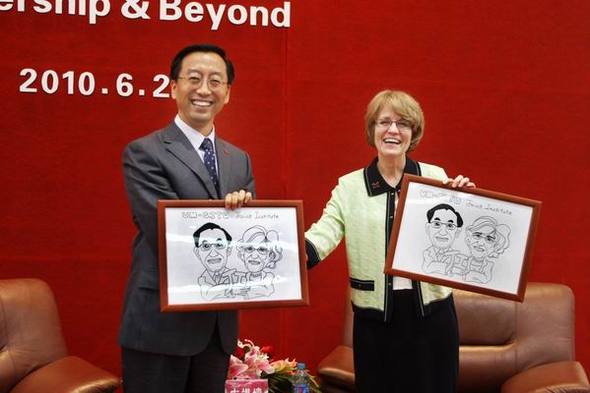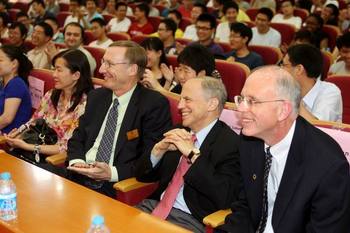University of Michigan, Chinese university aim for improvement in lithium battery technology

University of Michigan President Mary Sue Coleman is pictured this week in China with Shanghai Jiao Tong University President Jie Zhang.
Photo courtesy of U-M SJTU Institute
Researchers from the University of Michigan and Shanghai Jiao Tong University hope to develop lithium-air batteries with more than 100 times the storage capacity as traditional lithium-ion batteries, according to the Shanghai Daily.
U-M and SJTU revealed details about their first joint engineering research project on Tuesday. The universities, which collectively operate the U-M SJTU Joint Institute, announced plans Tuesday to devote $1.2 million to six research projects.
The lithium-air project aims to provide more efficient batteries for
electric vehicles, making them competitive with traditional internal
combustion engine cars.

University of Michigan Vice President for Research Stephen Forrest (left), emeritus political science and business professor Kenneth Lieberthal (middle) and College of Engineering Dean David Munson (right) visit Shanghai Jiao Tong University in China this week.
Photo courtesy of U-M SJTU Joint Institute
"The new battery is expected to be developed in two to three years and put into use in five years," Ni Jun, dean of UM-SJTU Joint Institute, told the Shanghai Daily.
Although China's auto industry is still in its infancy, China is considered a world leader in lithium-ion batteries due to its extensive expertise in power storage for small electronics, such as laptops and cell phones.
U-M hopes the joint research project with SJTU could help the universities land headquarters for the U.S. China Clean Energy Research Center, a $150 million project announced by the American and Chinese governments last year.
Contact AnnArbor.com's Nathan Bomey at (734) 623-2587 or nathanbomey@annarbor.com. You can also follow him on Twitter or subscribe to AnnArbor.com's newsletters.


Comments
Nathan Bomey
Thu, Jul 1, 2010 : 8:37 a.m.
Thanks for catching that. I've corrected the caption to reflect the corrected information.
glacialerratic
Wed, Jun 30, 2010 : 7:27 p.m.
That's not Steve Grafton in the photo, but Kenneth Lieberthal, Emeritus Professor of Political Science and Business.
trespass
Wed, Jun 30, 2010 : 5:20 p.m.
It makes sense that China would develop lithium battery technology since they have cornerd the world wide market for lithium. The key is what are the intellectual property arrangements for this deal. If it benefits China and UM but does not benefit Michigan or the USA then it is a bad deal. The University needs to disclose the terms of the agreement.